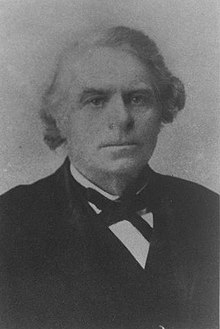Solomon Mead
Solomon Mead | |
|---|---|
 | |
| 1st Principal of Storrs Agricultural School (University of Connecticut) | |
| In office 1881–1882 | |
| Preceded by | None |
| Succeeded by | Henry P. Armsby |
| Personal details | |
| Born | November 10, 1829 South Salem, New York |
| Died | 1905 (aged 75–76) New Haven, Connecticut |
| Nationality | American |
| Spouse(s) | Elizabeth Chapin Deming, Clarissa Adele Green |
| Profession | Farmer, iron founder, academic administrator |
Solomon Mead (November 10, 1829 – 1905) was an American farmer, inventor, and iron founder who served as the first Principal of the Storrs Agricultural School, later the University of Connecticut (1881–1882).[1]
Life
[edit]The eldest of five sons born to Richard and Hannah (Keeler) Mead, Solomon Mead was born in South Salem, New York, on November 10, 1829. He moved to New Haven in 1852 and three years later (on January 17, 1855) married Elizabeth Chapin Deming of Derby. The family lived on New Haven's Derby Avenue.[2] Elizabeth Deming Mead passed away in New Haven on April 23, 1890.[3] Mead subsequently married Clarissa Adele Green (1853–1916), who survived him. Mead and his first wife had seven children, three of whom survived their father.[4]
Solomon Mead's younger brother, Linus Mead (1835–1906), also lived in New Haven after 1870 and helped with his sibling's plough manufacturing concern.[4]
In May 1857, the Scientific American reported that Mead and his wife had suffered from mild arsenic poisoning due to contaminated wallpaper in their home.[5]
Career
[edit]On September 15, 1863, Mead patented a plough featuring a curved moldboard, which according to the patent turned soil more thoroughly with less effort.[6] Termed a "conical plough" or "cylinder plough," it received positive reviews from various agricultural publications.[7] As of 1876, Mead owned a four-story shop and iron foundry in New Haven, which he used to manufacture and distribute his patented ploughs.[8] He also studied agriculture at the Sheffield Scientific School.[9] He was a member of the New Haven County Horticultural Society.[10]
Storrs Agricultural School
[edit]Intended to educate young men in practical science and agriculture, the Storrs Agricultural School was established in April 1881 by the Connecticut General Assembly on the basis of donated land and money from Charles and Augustus Storrs.[11] In August 1881, the school's trustees appointed Mead principal and professor of agriculture. He came "warmly recommended" by Samuel William Johnson. Mead's wife acted as school matron. The New York Tribune called Mead "a plain, shrewd, active and even-tempered man" with "a wide experience in and a varied knowledge of agriculture, horticulture, and arboriculture."[9] The Journal of the American Agricultural Association described Mead as a "practical farmer and gardener."[12]
Mead was responsible for running the school and was not expected to participate in instruction.[9] Henry P. Armsby oversaw academics in his capacity of vice-principal and professor of agricultural chemistry. Benjamin F. Koons became professor of natural history. These were the three founding faculty at Storrs Agricultural School.[13]
Mead presided over the first year of the Storrs Agricultural School, enrolling six students for the class of 1881 and eighteen for the class of 1882. He retired in April 1882 and was succeeded by Armsby on an acting basis until the appointment of Koons at the start of the winter term 1883.[14][15]
After retiring, Mead returned to New Haven and continued to live there until his death in 1905.[16]
References
[edit]- ^ Ballestrini, Christine (2019-05-24). "University of Connecticut Office of the President | History". Retrieved 2020-07-22.
- ^ Phoenix, Stephen Whitney (1878). The Whitney Family of Connecticut, and Its Affiliations: Being an Attempt to Trace the Descendants, as Well in the Female as the Male Lines, of Henry Whitney, from 1649 to 1878. New York: Priv. Print. [Bradford Press]. p. 956.
- ^ Boughton, James (1903). Genealogy of the Families of John Rockwell, of Stamford, Connecticut 1641, and Ralph Keeler, of Hartford, Connecticut 1939. New York: William F. Jones. p. 208.
- ^ a b Frost, Josephine C. (1915). The Strang Genealogy: Descendants of Daniel Streing, of New Rochelle, New York, with Special Records of the Purdy, Ganung, Kissam, Sackett, Bloomfield, Keeler, Belcher, Morgan, Whitney and Thorne Families. New York: Bowles--printer. pp. 115–116. ISBN 9780608359359.
- ^ "Poisonous Wall Paper". Scientific American. 1856-05-23. Retrieved 2020-07-22.
- ^ United States Patent and Trademark Office (1863-09-15). "Patent USA100039943". Retrieved 2020-07-22.
- ^ United States Department of Agriculture (1867). Report of the Commissioner of Agriculture for the Year 1866. Washington, D.C.: Government Printing Office. pp. 249–250.
- ^ Connecticut Supreme Court of Errors (1882). Connecticut Reports: Being Reports of Cases Argued and Determined in the Supreme Court of Errors of the State of Connecticut. Banks & Brothers. p. 226.
- ^ a b c "A New Agricultural School. The Gift Of A Brooklyn Man To The State Of Connecticut". New York Tribune. 1881-07-25. Retrieved 2020-07-22 – via Readex.
- ^ "The Horticulturists: Annual Meeting of the County Society Today". New Haven Register. 1880-11-11. Retrieved 2020-07-22 – via Readex.
- ^ Stemmons, Walter; Schenker, André (1931). Connecticut Agricultural College, a history. Storrs, Conn. pp. 33–38. OCLC 926142.
{{cite book}}: CS1 maint: location missing publisher (link) - ^ Gold, T. S. (January 1882). "The Storrs Agricultural School". Agricultural Review and Journal of the American Agricultural Association. 2 (1): 26–27 – via Google Books.
- ^ Stave, Bruce M (2006). Red brick in the land of steady habits: creating the University of Connecticut, 1881-2006. Lebanon, NH: Univ. Press of New England. pp. 2–4. ISBN 978-1-58465-569-5. OCLC 836219917.
- ^ University of Connecticut Archives & Special Collections. "A Guide to the University of Connecticut, President's Office Records [Solomon Mead, 1881-1882]". ctdigitalarchive.org. Retrieved 2020-07-22.
- ^ "Collection: University of Connecticut, President's Office Records [Solomon Mead, 1881-1882] | UConn Archives & Special Collections ArchivesSpace". archivessearch.lib.uconn.edu. Retrieved 2020-07-22.
- ^ "News of the State - Tolland County". The Hartford Courant. 1882-04-15. ProQuest 554158998.
